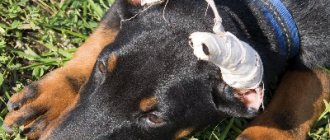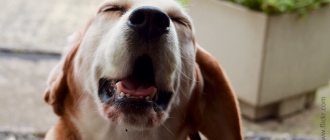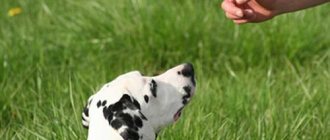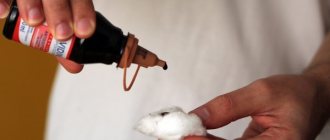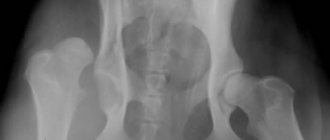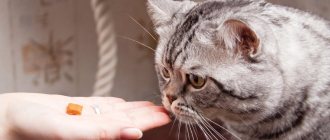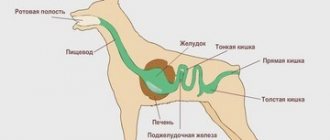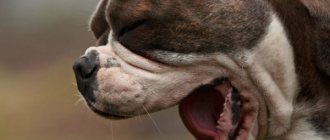The nose of a healthy dog
- The tip is cold.
- Moderately humid.
- The exhaled air is uniform, of medium strength and symmetrical from both nostrils.
- The color of the mucous membrane is pale pink, changing to pink-red when excited.
- No cuts or cracks.
- No swelling, overlays or ulcers.
- No discharge (snot).
Dryness is explained by limited sweat production or its complete cessation.
A decrease in the secretion of glands can occur in diseases that occur with a large loss of water from the body. Wet and cold skin becomes dry and hot (cold) to the touch, and with prolonged illness, cracks and crusts appear.
Features of diagnostics in the clinic
The veterinarian and the owner must find out why the dog has no appetite. To do this, you need to find out what kind of food the pet was fed, whether there was anything unusual in the diet, whether the animal was sick before and whether it was given any medications. Very detailed information is needed from the owner. This will help eliminate visible causes of lack of appetite. When they are excluded, the doctor should examine the pet for the presence of the disease. To do this, urine and blood tests, hormone tests, x-rays to exclude a tumor, ultrasound, and tests for parasites are performed.
After this, the doctor makes a conclusion and, if necessary, prescribes treatment. He can also prescribe what to give your dog to improve his appetite.
Your Dog Has a Dry Nose: When to Worry
You're used to the cool, wet dog's nose poking your hand for affection. But this time, when your pet nudges you, you notice that your dog's nose is dry and warm to the touch. Does this mean the dog is sick?
Not always. A dog's nose naturally changes from wet and cool to warm and dry several times throughout the day. As a rule, a dog's dry nose is a completely normal physiological phenomenon. But when should you worry?
And in general, why does a dog have a wet nose?
There are two reasons why a dog's nose is most often wet:
- A thin layer of mucus on a dog's nose helps it smell better. Dogs' excellent sense of smell exists in part due to this layer, which helps absorb and retain odors. You might even see your dog licking his nose, a way to literally “taste” the scent, which gives him even more information about the world around him, according to Vetstreet.
- The nose is also one of the few organs dogs have that helps them cool down. Dogs do not have as many sweat glands as their human owners. Instead, dogs “sweat” through their nose, tongue, and paw pads as part of their thermoregulation system.
My Dog's Nose Is Dry: Should I Be Worried?
In most cases, a dog's dry nose is not something to worry about. Some dogs naturally have drier noses than others. A dry nose may simply indicate that your dog has just woken up from relaxing in the sun or near a heater, or that your four-legged friend needs a drink of water because he is a little thirsty. But sometimes a dog's dry nose can be the result of health problems, such as:
Sunburn. If your dog has a dry, red nose or the skin on his nose is flaky, it could be sunburn. Talk to your veterinarian about a special sunscreen lotion. Dogs with pale or pink noses are more prone to sunburn. Protecting their sensitive skin on their face is important because repeated sunburn can lead to skin cancer.
Skin disease. If your dog's nose is flaky, crusty, or sore, it may be a skin condition. An examination by a veterinarian will be required to confirm the diagnosis.
Severe dehydration. A dry nose will likely be just one of many symptoms in a dog suffering from severe dehydration. Other symptoms are sunken eyes, dry gums, loss of skin elasticity (turgor) and weakness. Give your dog water immediately and seek help from a veterinarian if you suspect your dog is severely dehydrated.
Strange colored nasal discharge. When examining your pet, pay attention to nasal discharge. If your dog has a runny nose (simple rhinitis), the mucus will most likely be clear. If she has foamy, thick, yellow, green or even black nasal discharge, contact your veterinarian.
Do dogs get runny noses too?
A runny nose can be caused by certain health problems in your dog. Nasal discharge may indicate a serious problem, such as an upper respiratory tract infection. Usually a dog's dry nose is not a cause for concern, but it can still be one of the subtle signs of an incipient disease. Most often, if a dog's dry nose is caused by an illness, you will see changes in your pet's behavior, such as lethargy, poor appetite, or vomiting, which indicates a visit to the veterinarian is necessary. If your dog appears as alert as usual, there is no cause for concern, but it is worth keeping an eye on him just in case. Finding out the true cause of your pet's dry nose will allow you to determine whether your dog is healthy or if it is a symptom that you should be concerned about.
Erin Ollila
Kara Murphy is a freelance writer living in Erie, Pennsylvania. She has a goldendoodle named Maddie. Kara>
Possible causes of dry nose
- A dog's nose may become dry if the room temperature is too high (heat). Also, at excessively low temperatures (frost, wind), dry skin will be noted.
- During sleep, the animal's body temperature rises, i.e. becomes higher than normal, which leads to evaporation of moisture.
- If you were engaged in training or outdoor games with the dog.
- In puppies or in mature dogs. But, you need to take into account that in old age, dryness in a dog can lead to tissue diseases, which occurs due to metabolic disorders, and this is already a pathological case.
- Change of place of residence, environment or experience of shock in animals.
- Dryness can be passed on from generation to generation.
- During estrus, pregnancy and feeding puppies, the reason is hormonal changes in the body.
- A poorly designed diet that contains a lack of any microelements, vitamins and minerals.
- Insufficient fluid intake.
- Species, gender, age, different metabolism and much more.
All the reasons described above should lead to dryness for a short period of time, no more than two hours.
If the manifested symptom does not disappear, or, moreover, additional symptoms appear that are not inherent in the normal and healthy behavior of the animal, then this indicates unfavorable, pathological changes in the dog’s body.
Reasons why your puppy's nose may become dry
Many owners become very worried if they find that their puppy's nose is dry or hot. However, there are natural reasons why a puppy's nose may become dry, let's look at the most common ones.
Long sleep. When a puppy sleeps, his metabolism and the functioning of all systems except the immune system slow down. The mucous membranes are less active and the nose may dry out. At the same time, the lack of fluid to moisturize the nose makes it hotter.
Hot weather. When a dog is hot, it breathes with its mouth open. During active breathing with an open mouth, the puppy experiences the expected disturbance in the water-salt balance. This disorder allows the body to cool down and leads to a decrease in the intensity of the work of all mucous membranes, except those that cover the mouth. A dry nose in hot weather indicates that the puppy is thirsty. If your pet has the opportunity to drink, the mucous membranes will work normally.
Dry air. Low air humidity is typical for some climate zones. In everyday life, all city residents face the problem of increased dry air during the heating season. Heating radiators dry the air around the clock, which negatively affects the functioning of the mucous membranes of all animals and people in the home.
Tip: to maintain normal air humidity in your home (at least 50–60%) throughout the heating season, it is recommended to use a humidifier.
Features of the structure of a dog's nose
The structure of a dog's nose is different from that of a human's. There are side slits on its surface. They help you better recognize odors. Air enters the inside of the nostrils but exits through slits on the side. Inhaled new odors do not mix with those already released.
A dog's nose can become dry for a variety of reasons.
Thanks to the structure of the dog's nose, the animal is able to inhale air from the front and sides. If the dog is alarmed, then his nostrils inhale odors that are located behind him. Due to the incisions, the respiratory organ has better mobility, which makes it easy to capture all odors.
Important! If a pet breathes through its mouth, then the air does not enter the lungs, but when exhaled, it passes through the receptors of the nose. They help to obtain new information about the smell.
Another distinctive feature of the canine respiratory organ is that it is covered in mucus. The film is located not only inside the nostrils, but also outside. The wet coating makes the nostrils more sensitive to foreign odors, helps the animal to catch and analyze them, further protecting them from bacteria.
Dogs often lick their nose. This helps to further moisturize it, maintain sensitivity to odors, and cleanse it of impurities.
A dog's nose is dry and warm under normal conditions.
A pet's warm and dry nose is not a cause for concern. When a dog is at rest or sleeping for a long time, its body temperature rises. Don't immediately start worrying about his well-being. When the dog wakes up from sleep, starts running and eating, his temperature balance returns to normal.
An increase in body temperature is a reaction to an allergy. In this case, it is worth looking for the cause of the allergy in order to eliminate it. These can be household products for cleaning dishes, washing clothes, wiping furniture, washing floors. They need to be replaced with eco-friendly products that will not cause painful reactions. The cause may be a dog's food or water bowl made of toxic plastic. It should be replaced with better quality cookware. You should not walk with your pet in places where ragweed blooms; you should avoid flowering trees.
In the apartment where the dog is located, wet cleaning should be done more frequently, and do not forget to humidify the air. If the dog is nervous for some reason, you should try to calm him down. An overheated pet should be brought into a cool room, moistened with water, and a frozen pet should be warmed up by wrapping it in a warm blanket.
A dog's dry nose is not always a cause for concern.
Note! A pet's rapid breathing without exercise may indicate heat stroke, allergic reactions, parasites in the lungs, or poisoning.
Symptoms of pathological diseases
The symptom of dry nose in pathological conditions and diseases of the animal’s body does not appear alone. Along with it, various kinds of symptoms appear, depending on the type of disease, such as:
- low and high apical temperatures;
- loss of appetite;
- lethargy;
- redness of the eyes;
- violations of integrity (cracks, ulcerations, swelling);
- expiration;
- sneezing;
- cough and many others.
It is necessary to take into account that the “collection” of some symptoms may indicate either one specific disease or several completely different ones.
The main causes of pathological diseases and their symptoms:
1. Spending time outside or in the house, a dog can introduce a foreign body into its body, or cause injury (dry and hot nose).
2. With an insufficient amount of fluid entering the body, the dog can easily be led to a pathological condition (dry and hot nose).
3. If there is severe loss of fluid, for example with vomiting, frequent urination, or loose stools, dehydration will also occur (dry nose, lethargy and high temperature).
4. Some types of allergies in dogs: food, to flea saliva or to environmental substances (dry nose, snot, red eyes).
5. Lack of vitamins in dogs is expressed in the form of vitamin deficiency and hypovitaminosis (dry and cracked nose, lethargy).
6. Intake of toxins (dry and hot nose, lethargy).
7. Infection with helminths and their eggs (lethargy and dry nose).
8. In case of infection (dry and hot nose, snot flowing).
9. Autoimmune skin disease (papules and pustules, erosions and yellow crusts form, a cracked nose, the dog does not eat and the nose is dry).
10. Canine distemper (redness of the eyes, the dog’s nose becomes dry and flaky).
11. Interstitial nephritis (dry and hot nose).
12. The postoperative period may involve dehydration (dry and hot nose).
There's no reason to worry
In what cases is a warm and dry nose not a cause for concern?
Age or individual characteristics of the pet
It is not uncommon for small puppies to have warm noses. If in general nothing has changed in the baby’s behavior, then there is no need to worry. The puppy will grow up, and everything will return to normal.
There are cases when some dogs always have a warm nose. This is already an individual feature. It’s just that the nasal mucosa in such animals is “passive”. And for them this is the norm.
The dog is sleeping or has just woken up
Pets that lead a calm and measured life lose the need for anxiety and a sensitive state during sleep. They do not need to be constantly on the alert, worry and catch with their nose the slightest changes in the environment. They sleep calmly and peacefully. The nose is also resting. Therefore, during sleep, the nose is dry. But as soon as the mustache wakes up, everything immediately returns to normal.
Overwork
For several hours in a row, your four-legged animal actively swam, ran and jumped. And when he returned home, he “fell without his hind legs” and does not react to anything. And the nose is dry and warm.
Don’t worry, it’s just that your little toothy has lost strength due to active pastime. He'll rest a little and everything will be fine again.
Stress
A dog can also have a dry nose when it is afraid of something or is nervous. Monitor your pet's emotional state. Try to provide him with the most comfortable and calm environment possible.
Weather
Extreme heat or cold can also cause a dry, warm nose. Under the scorching rays of the sun, the skin on a dog's nose, like a person's, can burn.
In extreme heat, try to provide the animal with the most comfortable conditions possible: shade, plenty of drink and access to water. How to do this, read about how to protect your dog in the heat.
The same applies to severe cold. Severe frost can cause your nose to become dry and even cracked.
Microclimate in the house
Sudden temperature changes, air conditioning and heating very dry the skin. If the air in the apartment is dry, not only the dog, but also everyone in the household will have problems with dry skin.
Pregnant or lactating bitches
A warm and dry nose in pregnant or lactating bitches is considered normal.
We've looked at cases where a warm, dry nose is not a cause for concern. Now let's talk about when a pet's dry nose is a sign of a particular disease.
Healthy dog nose
During the day, the dog's nose is usually wet and cool. But also during the day there is periodic and short-term drying and warming.
A dry nose may occur for the following reasons:
- after significant physical exertion and excessive active games, after which the pet is clearly tired or overtired;
- during the heating season, when the room has warm and dry air;
- when the dog is sleeping, the nose is usually dry (or for a short time after waking up - due to a slowdown in metabolism and a decrease in the secretion of moisture);
- in a moment of fright or nervous overstrain;
- reaction to sudden changes in weather (dogs are especially sensitive to windy weather);
- at the moment when puppies change teeth from milk to permanent, the condition of the nose periodically changes;
- period of estrus in a female dog due to hormonal changes;
- a warm and dry nose in puppies is considered normal even for a long time, if at the same time they look healthy, active, with a good appetite and a normal frequency of emptying the bladder and intestines;
- After giving birth, a nursing bitch is allowed a dry nose (but not a hot one) in the first day or two;
- individually slow metabolism and the special structure of the nose can lead to the fact that some individuals have a dry and warm nose almost throughout their entire lives.
All of the above reasons are not accompanied by any further symptoms, and warming of the nose is a short-term phenomenon. If the nose is warm for several hours, but the pet’s external condition is alarming and additional symptoms are added, then this may well be a sign of some disease.
Prevention
In order to avoid the risk of disease, you need to know about the preventive measures that the owner himself can carry out and support. The most important thing is to always be attentive to your pet and take proper, complete and proper care of it.
- It is necessary to monitor walking areas located outside the living quarters. Dirt is a kind of storage and cause of various kinds of infections and parasitic diseases. There may be debris, metal objects, glass shards, plastic that the dog can eat or injure itself.
- It is necessary to control contacts with other animals: stray dogs, cats, hedgehogs. These are potential carriers of infections and diseases, and in some cases, they can infect a dog with rabies.
- If the weather is hot, then reduce the time you spend outside, or find a place where direct sunlight will not penetrate.
- Always have a bottle of water with you so that your pet can always quench its thirst.
- Try not to take your dog to places where there may be sources of allergies.
- If the time of winter weather has come, then you should reduce your time spent outdoors, or use special clothing for animals.
- After a walk, you should always bathe the animal to destroy pathogenic microflora brought with dirt.
- Create a comfortable temperature in the room and eliminate drafts. Monitor the cleanliness and hygiene of the premises and ensure a favorable environment.
- The dishes must be clean, food and water must be fresh, of high quality and properly selected.
- Change the water every day and make sure there is always plenty of it.
- And most importantly, carry out annual vaccination and deworming (anthelminthic therapy) of your pet. To do this, you need to contact a veterinary clinic so that the doctor examines the animal and advises the owner about everything that concerns his dog.
What should the owner do?
Don't panic if your pet suddenly has a dry, warm nose. At first, you need to observe his behavior, see how active he is, whether he has an appetite, etc. If everything is in order, then the dryness is short-lived and will soon pass. If a warm nose is observed for a long time, and the animal’s condition gradually worsens, it is necessary to measure the temperature. If the readings are more than 38.5, you should take the animal to the veterinarian: this temperature indicates the occurrence of some kind of disease.
If the temperature is critically high (above 40°C), first of all it is necessary to bring it down and only then take it to the clinic.
First of all, it is important to pay attention to the behavior and well-being of the dog, and not to the dryness of the nose. If the pet is alert and active, then this is a temporary phenomenon caused by natural causes; the owner has no reason to worry. However, if, in addition to this, other symptoms are observed, it is better not to delay a visit to the doctor. The sooner you start treatment, the faster your pet’s condition will improve.
Treatment
In case of injury. It is necessary to stop the bleeding. Identify the cause and location of the injury and disinfect the area. If necessary, administer anesthetic and apply stitches. Take medication that will promote further healing. Preparations: Lysozyme, Travmatin, Ranosan, etc.
When dehydrated. Force drink water using a syringe. Apply a dropper with glucose solution. If necessary, then medications.
For allergies. If you have a food allergy, then choose a diet that excludes those foods that cause an allergic reaction. If you are allergic to fleas, use collars and special shampoos. With Atopic allergies, the animal cannot be cured, but with the use of certain medications, vital signs can be improved. Medicines: Antihistamines.
With vitamin deficiency. Review and recalculate the animal’s diet, balancing it.
In case of poisoning. It is possible to wash the gastrointestinal tract with potassium permanganate. Preparations: vitamin B6, adsorbents.
For helminths. Anthelmintics.
For colds. Depending on the type of cold, take certain medications. Medicines: antibiotics, vitamins, immunostimulants, anti-inflammatory and expectorants.
Pet owners should understand that self-medicating their pet is very dangerous, this can lead to a deterioration in its condition, or, in the worst case, death.
What to do if your puppy has a dry nose
If the owner of the animal notices this symptom, then he should first take care of the following factors:
- Replacement of plastic bowls for food and drink with dishes made exclusively from stainless steel, and toys for pets with higher quality ones.
- Walking the puppy during the flowering period of many plants (spring-summer) should be done away from them, the place of walking should be a ventilated open space.
- Regularly wash your dog's bowl without using detergents.
- If there is even the slightest suspicion of an allergic reaction in an animal, you should immediately seek professional help from a veterinarian.
- If your animal develops other symptoms of a cold, carefully lubricate the tip of its nose with a calendula-based ointment to alleviate its condition.
- If the nose is dry and the animal's body temperature rises at the same time, you should immediately seek help from a veterinarian.
- A similar procedure should be followed if you suspect pemphigus or have an injury.
Factors affecting a dog's appetite
There are a number of other reasons why a dog may have a poor appetite.
- Stress and depression
- Worms
- New and unusual food
- Dental problems
- Diseases of the stomach and intestines
- Side effects of medications
- Vaccination
When determining the reasons, you must also take into account the above factors. If the animal has been treated, vaccinated or prescribed any medications, the veterinarian conducting the study must be notified.
Other Causes of a Dry Dog Nose
There can be many reasons why a healthy dog has a dry nose. As mentioned above, dry nose in dogs can be associated with a period of sleep when the pet has not yet fully woken up. Or tired after a long walk, having run around and played enough with other four-legged animals.
Perhaps these are the consequences of a stressful situation, nervous overexcitation. Dryness and warmth of the nose are caused by hot weather outside, indoors, or vice versa, too frosty weather.
If the nose lobe becomes dry when the puppy plays, you should pay attention to the quality of the material from which his toys are made; perhaps they are the cause of his allergy.
Note! The cause of allergic reactions in puppies can be ordinary dust in the apartment, flowering indoor plants, or the foods they are fed.
Spitz, Yorkies, and other decorative dogs are especially susceptible to food allergies.
Particular attention should be paid to the puppy if he has a rough, cracked nose, severe diarrhea, coughing, or if he constantly regurgitates what he has eaten. The reason that your puppy's nose begins to dry out can also be due to extreme heat in the room. In such an atmosphere, it becomes difficult for the baby to breathe.
A newborn puppy's nose not only detects odors, but is also a heat sensor.
Briefly about the main thing
- A healthy dog's nose is cold and moderately moist.
- Dryness is explained by limited sweat production or its complete cessation, but does not always signal illness.
- The symptom of dry nose in pathological conditions and diseases of the animal’s body does not appear alone.
- To prevent the risk of disease, you need to regularly monitor walking areas, the amount of fluid consumed, and also prevent overheating or hypothermia.
- If a problem occurs, you should immediately contact a specialist.
The fifth reason is changing weather conditions
Changes in weather are an important physiological factor that influences changes in the condition of the mucous membranes and the nasal planum in particular. The cause of a dog's warm and dry nose can be cold or extreme heat. Being constantly exposed to the sun's rays, the animal's skin is protected by fur. But the nose remains unprotected, so it can even get burned and hardened. In hot weather, it is recommended to provide your pet with proper care and comfort:
- create shadow;
- provide constant access to clean drinking water;
- avoid overheating.
In severe frosts, the skin on a dog’s nose can not only dry out, but also crack. Severe dryness indoors in winter, as well as sudden temperature changes, negatively affect the condition of the mucous membranes and open surface of the nose. It is important to maintain the required humidity in the room. This will benefit not only pets, but also the person himself. After all, it is known that for the proper functioning of the epithelium, which produces mucus and removes everything unnecessary from the body, the immune system works better.
General recommendations
So, every dog owner should understand that if the dog’s nose is dry and hot, you should not immediately run to the veterinarian. You just need to carefully observe the behavior of your ward. If the behavior does not change, the animal is active and mobile, eats with appetite, then there is nothing to worry about. If deviations in the condition of the nose are accompanied by a pronounced change in the physiological balance of the animal, then it is worth looking for the reason that caused it, calling on the professional experience of a veterinarian to help. He will help make the correct diagnosis and prescribe the correct treatment.
In order for your pet to always be in excellent condition, you need to regularly perform the same actions: avoid dehydration, diversify the menu, regularly walk it, clean it from parasites every quarter. It is important not to use hygiene products that can cause an allergic reaction, to maintain optimal temperature conditions for living (so that it is neither too cold nor too hot), and if the inflammatory process begins, immediately seek medical help.
Currently reading:
- 6 Factors for a Cold or Wet Dog's Nose
- Seven Signs and Remedies for Getting Rid of Fleas in Dogs
- How and with what to treat a runny nose or rhinitis in dogs
- Tips for proper dog burial
Causes of dry nose in dogs
Canines usually have a hot nose, which is also moist. The misconception that if a dog has a cold and dry nose is sick is widespread. Therefore, it is important to systematize the signs that can be used to identify a really sick animal, or those that will allow vigilant owners to get rid of doubts. If all the reasons that you have managed to sort out do not correspond to reality, you should turn to the reasons for the animal’s illness.
- Typically, a dry nose signals the presence of a fungal or infectious disease; some viruses also have this effect. It is especially important not to miss distemper or rabies.
- Perhaps the animal is suffering from a cold or mild hypothermia. Consider this option if your dog has a dry nose and no appetite.
- A dry nose may not be a symptom, but a reaction. It usually occurs if the vaccine did not suit the animal, it was bitten by a tick, or an invisible but painful injury to any part of the body occurred.
- The condition of the nose changes during recovery after surgery. At these moments, the anesthesia is removed from the body.
- The reason may lie in the dog being infected with parasites (the most common are worms). When infested, serious poisoning occurs, but do not rush to diagnosis. Allergic reactions are very similar.

